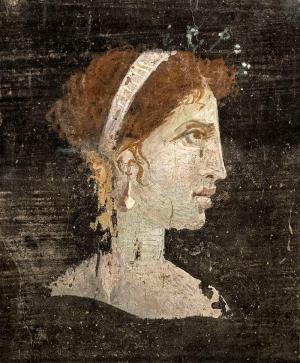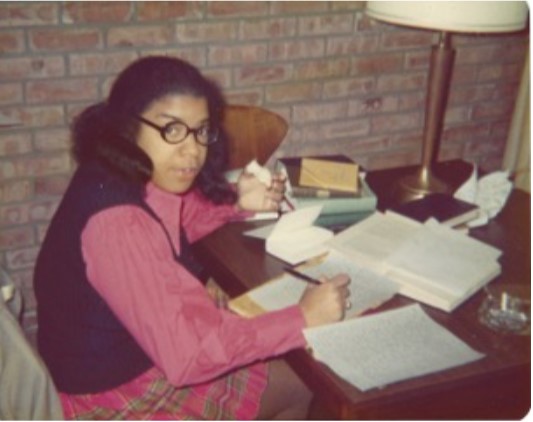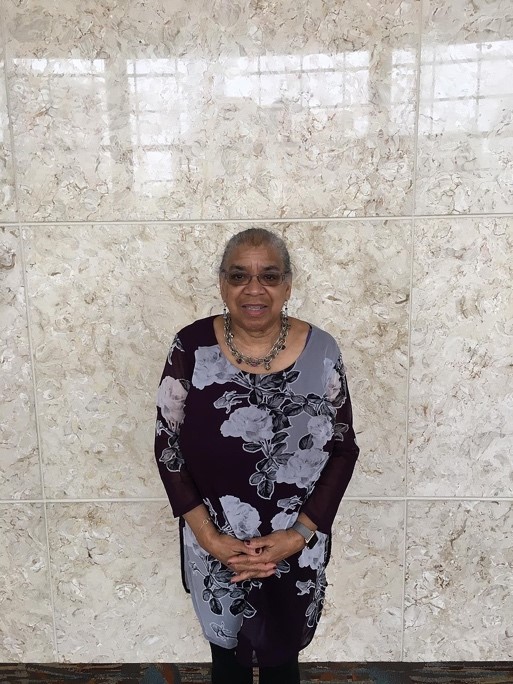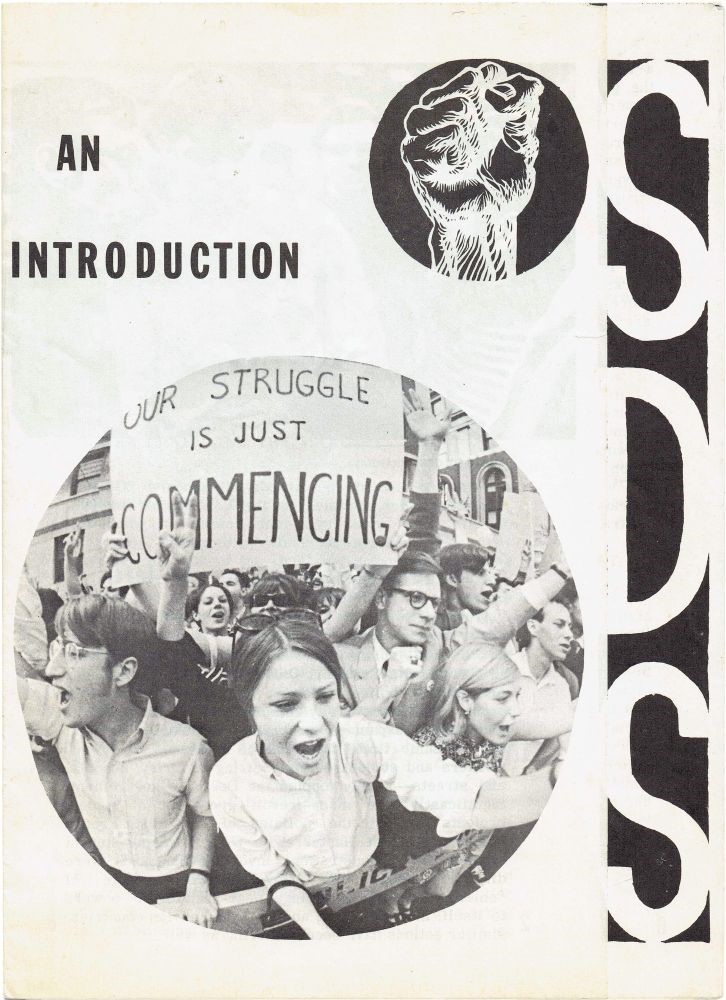
Our second interview in the Women in Classics series is with Shelley Haley, Edward North Chair of Classics and Professor of Africana Studies at Hamilton College. She was born in upstate New York and earned her B.A. from Syracuse University in 1972. She received her M.A. in 1975 and her Ph.D. in 1977, both from the University of Michigan. An expert on the figure of Cleopatra, Dr. Haley has discussed the subject on both the BBC and the Learning Channel. Her publications include Fanny Jackson Coppin’s Reminiscences of School Life, and Hints on Teaching (1995) and numerous articles on the role of women in the ancient world and on race in the discipline of Classics.
Haley previously taught at Howard University, and was a distinguished visiting scholar at Washington University-St. Louis. She has lectured widely on increasing the representation of students of color in Latin, Ancient Greek, and Classics classrooms, as well as on her research about the role of a classical education in the lives and careers of 19th-century college-educated black women. In 2017 she received an award for excellence in teaching at the collegiate level from the Society of Classical Studies. She will serve as the President of the Society for Classical Studies in 2021.

Image used by permission of Professor Haley.
CC: How did you come to Classics?
SH: I’m an accidental Classicist. I was raised by my grandmother, my father’s mother. My own mother died when I was quite young. My grandmother drummed into us four kids that we would finish school and get our education. What she had wanted more than anything else for herself was to be an elementary school teacher, but because she was a black woman living in upstate New York, she had to leave school in order to support her family. Leaving school was the one thing she always regretted. She wanted us to stay in school, especially me, because I was the oldest girl. She used to say to me, “Shemdem,” which is what she called me, “Shemdem, you’re going to be a teacher. You’re going to be the teacher I couldn’t be.” I had that in my head from the time I was very young, even before my mother died.
I went to high school in Bath, New York. I fully intended to do what was called the Regents Track, which led to college. In those days, you had to have a Regents diploma from New York State in order to go to any college, whether state or private. My father had gone to Syracuse University during the Great Depression. Imagine that! When I tell this story to my students, I always impress upon them, “I want you to think about what it meant for a black man to go to college during the Depression, and the sacrifices that his family had to make in order to make that happen.” He was a football player, which helped, but the scholarships they had back then weren’t like what they have today. But anyway, my father had gone to Syracuse University. So I had my grandmother on one side saying, “You will finish school. You will finish school.” And I had my father on the other side saying, “One of you four is going to go to Syracuse.” And I thought, “It’s going to be me.”
CC: Tell me about your experience in high school.
SH: I remember the first day of pre-orientation for high school. I went with my father to the guidance counselor to set up my program for the coming year. And the guidance counselor took a look at my name and said, “Oh, you’re Ethel’s granddaughter!” You know, it was small town! He said, “Your grandmother is a fabulous cook. Just fabulous!” And then he said, “We’re going to put you in the Home Ec Track. You’ll be a great cook just like your grandmother.” I was very shy, so I didn’t say anything. In fact, when I was a child I stammered, so I tended to stay quiet. Luckily, my father was there. He spoke right up, and he said, “No, you don’t understand. She’s going into the Regents Track. She’s headed to college.” He explained gently and firmly to the guidance counselor that we were not interested in Home Economics. The guidance counselor was a white man, and he was very discouraging, and very skeptical. In the end, he caved. Then he started telling me all of the requirements for college. He said I had to take four years of math, and four years of English, and four years of History, and four years of science. All of that was fine by me. But then he said, “You also have to take four year of a foreign language.” And I was devastated. I felt, because of my stammer, that I just couldn’t do it. I knew I couldn’t keep up in French or Spanish in the classroom. But the guidance counselor suggested Latin, and that’s what I took!
CC: What was your high school Latin class like?
SH: I had a fabulous teacher, Mrs. June LeRay. On the first day, we got our books, sat down, the whole routine. Mrs. LeRay said, “All right! Everyone, turn to page 1.” Then she said, “Shelley, stand up and read the first sentence.” And I just burst into tears. Everyone was looking at me. The teacher came over, took me by the hand, and led me outside the classroom. She said, “Young lady, what are these tears for?” I said, “I can’t do this. I can’t, I can’t. I can’t do this.” Then Mrs. LeRay took me by the shoulders and said, “I never want to hear those words come out of your mouth again. You can, and you will. Go back in there, stand by your desk, and read the first sentence.” And I did! The first sentence was “Britannia est insula.” It was a liberating moment for me, to have someone believe in me, someone who didn’t know me at all. For Mrs. LeRay, I was just another student in her class.
People often ask me, “Why did you stick with Latin?” Honestly, in high school, Latin was the only course where I didn’t get into fights with the teacher. Here’s an example. I was in ninth grade, in my Social Studies class. The teacher was explaining what we were going to be doing during the year. She says, “We’re going to learn about the great civilizations of Greece and Rome and France and Italy.” And then, gratuitously, or at least that’s how it seemed to me, she said, “We won’t be learning about Asia or Africa, because those places contributed nothing to human civilization.” Well, shy as I was, I raised my hand and I said, “I read in the encyclopedia that the Chinese invented gunpowder.” She told me I was being impertinent and sent me to the principal’s office. I didn’t know what “impertinent” meant, but the way she spit it out at me, I figured it wasn’t good. So, I went to the principal. He was all right. He asked me to tell him what happened, and then he heaved a deep sigh. I think after that he and my father had a talk, and then the principal talked to the Social Studies teacher. For the rest of the year, she didn’t call on me anymore. She just acted like I wasn’t in the room.
A similar incident happened when I was taking American History. Back then – I’m really going to date myself here – it was only a few years since Hawaii and Alaska had become the 49th and 50th states. We were talking in class about how territories become states. The teacher said, “Puerto Rico will never become a state, because it’s not of Anglo-Saxon background.” I raised my hand and I said, “But Hawaii became a state, and it’s not of Anglo-Saxon background.” He glanced at me sharply, and he said, “Who told you that?” I said, “No one told me. Just look at the people who live in Hawaii.” Back to the principal’s office! That principal and I got to be fairly good friends.
Amidst all this, Latin was sort of a haven for me. We would parse and we would construe, and I didn’t have to worry about arguing over stuff. Now I know that there is plenty to argue about with Latin, but that came with learning more.

Image via Wikimedia under a CC-BY-SA 4.0.
CC: What happened when it came time for you to apply to college?
SH: In those days, it was a very different system. It wasn’t as high-powered as it is now. I had some letters of recommendation, and I took some achievement tests. Mrs. LeRay was proud because I got a perfect score on my Latin achievement test. But she never pushed me to be a Latin teacher. Besides, I had my grandmother to please, and I knew I was going to be an elementary school teacher. It didn’t even occur to me that I could teach Latin. It was something I enjoyed doing, and that was it.
When I got into Syracuse, I was really excited. I went to my father to show him the letter. He read the letter, and then he said, “Why do you want to go to college?” I was totally confused. I said, “You always said you wanted one of us to follow you to Syracuse.” He said, “Yeah, but I thought it’d be one of the boys.” I said, “What difference does that make?” He said, “You’re not going to use this. You’re going to stay here and you’re going to take care of me.” That’s how it was in my family. I am the eldest daughter. I was supposed to be the caretaker of my parents.
CC: What’s the story of your father’s family?
SH: We have been able to trace the family records back before 1823. We found the gravestone of the first Haley, as far as we can tell, who was enslaved in Spotsylvania County, Virginia. He was a barber, and his master would hire him out for his services. The two of them came to an understanding that he could keep a portion of the money that he made as a barber, and my ancestor saved that money and he bought his freedom. He came north to Steuben County and bought a plot of land and built a barbershop. He died in 1823. There’s no birthdate on the gravestone because I don’t think he knew when he was born. Since then his children and his children’s children had lived in upstate New York, and they were all barbers. My father was determined not to be a barber. His father was a barber, and his uncle was a barber, and they owned a barbershop in Bath, New York. My father was very good at cutting hair, and he used to cut my brothers’ hair, but he didn’t want to be a barber. What he really wanted to be, in the terminology of the time, was “the great Negro novelist.” It didn’t happen, sadly. He was a sports journalist, and he worked in Chicago. That’s where he met my mother, who was working for the black newspaper, The Chicago Defender. He was the sports journalist for that paper. Then my parents lived in D.C. for a while. Even before my mother’s death, my father bounced around a lot. He was frustrated, and he drank too much, and he could never really keep a steady job. I learned all this as an adult. As a child, I didn’t know much.

CC: But you did go to college in the end?
SH: I did. I went to Syracuse in 1968.
CC: What was your experience like in college?
SH: It was a racially diverse environment, which was new to me. I came from a very small town, which was mostly white. I was often the only child of color in my class. Often the only other children of color in the school were my siblings. I was very comfortable being around white people.
Of course, I had experienced racism. When I was nine, before my mother died, we moved from Philadelphia to Hampton Institute University in Virginia, a historically black college. The town of Hampton was still segregated. I think my parents handled this very badly. They should have sat us down and said, “Look, we’re moving to a place that’s very different to what you are used to. Here you must follow our instructions completely.” Instead, they told us nothing. And as a child, I gloried in disobeying my parents. Oh, I got such a thrill! If they said, “Don’t do X!” I would do X. Actually, I think, that is why I’ve been successful in Classics, because of my rebellious attitude.
But, back to Hampton. We lived on campus, because my father was Director of Public Relations, which made me an “admin brat.” That’s what I was called. There were faculty brats and there were admin brats. My parents told us, after we moved in, that we couldn’t go to Woolworth. Woolworth was a five-and-dime chain store which used to have soda fountains. There had been a Woolworth back in Bath, and we kids used to get on our bikes and ride and go get a milkshake, and then ride home. But here in Hampton my parents said we couldn’t go to Woolworth without one of them to accompany us. Well, you say that to Shelley, what is she going to do? She’s going to go to Woolworth. I don’t think I did it right away. It took a while. I remember how weird it felt to me to be in a social context where there were no white people. Among the children at Hampton, there was a real social hierarchy, based on skin color and based on the job your parents had. It was worse for me, because I was coming from the North, and I didn’t sound like everyone else. I was kind of shunned by the other kids. They thought I thought I was better than them, because I was from the North. It was not a happy experience.
One day, I was just feeling particularly lonely and in need of comfort food. I thought, “I’ll get on my bike and I’ll go to Woolworth and I’ll get a milkshake.” My mother was nowhere around. And my grandmother wasn’t living with us at that point. So I get on my bike. I don’t talk to anybody. I don’t tell anybody. I get on my bike, and I start pedaling. Now, my mother didn’t know how to drive. And anyway, my father had the car. And my mother at that point was severely overweight, so if she ran, I’m surprised she didn’t have a heart attack. I cannot tell you from that day to this how she did it, but as I pedaled up to Woolworth, I felt a hand grab the back of my shirt, pull me off the bike, whirl me around and – it was my mother – and slap me across the face. She said, “Now you get on that bike and you go home!” For years I felt angry and frustrated that she did that to me. She never told me what I did wrong, except that I disobeyed her. I didn’t learn until many years later that she was trying to protect me from the segregation at Woolworth. Because if I had walked in that front door, which I was going to do, and sat down at that counter…
CC: She was protecting you.
SH: She was. But I was talking about Syracuse. At the time when I was an undergraduate, the campus was very contentious, because of the protest against the Vietnam War and because of the rise of black nationalism and the Black Panthers. Students for a Democratic Society actually started at Syracuse. All of these different ideas were totally new to me. I remember feeling that same sense of isolation from the black students at Syracuse as I had back in Hampton. I felt more comfortable sitting with the friends I had made who happened to be white, and not at the “black table.” Because of this, the black kids decided I didn’t want to be black. But those just weren’t categories in my head.

Image via Wikimedia under a CC-BY-SA 4.0.
When I was a sophomore, I transferred into the School of Education. After I transferred, I thought, “Oh dear God. What have I done?” The classes were mind-numbing, just absolutely boring to me. I couldn’t stand it. I lasted two weeks. So, I went back to my pre-major adviser, who was ethnically German, and he taught German. Professor Jager was his name. I went back to him and I said, “What am I going to do?” You have to understand that my whole life, I had thought I was going to be an elementary school teacher. I was absolutely devastated by how much I hated the School of Ed. But Professor Jager nodded, and he said, “Ja, ja, I knew you would be back.” He suggested, “Major in German.” Obviously, I couldn’t do that! But then he started looking over my records and he says, “Well, what have you taken that you enjoyed taking?” And I said, “Well, I really like Latin. In fact, I just started Greek because I like Latin so much.” So he said, “Well, major in Latin.” So that’s what I did. I started taking lots of Latin, as well as Greek. I studied abroad, in Florence. I took an art history course and I took a course on the history of opera, which still sticks with me.
There was a very small group of black students at Syracuse, and we all knew each other. When it got around that I was going to major in Latin, it was a big deal. I remember one young woman, the most fiercely intellectual of the group, who just intimidated me totally with her intellect and presence. She came up to me at the lunch table and she goes, “What the hell you think you’re doing, Latin?” And I said, “What do you mean?” She said, “Latin? What are you going to do for black people with Latin?” She thought I was a traitor. I said, “Well, you know, I think we need black people who are successful at a lot of different things.” And she said, “You need to be out there. You need to be visible. Latin is invisible.” Oh, she was so mad. She was just so mad. She thought I was a total sellout.
The second part of the Women in Classics interview with Shelley Haley will be published Monday morning, January 13, 2020. It will address her experiences in graduate school and within academia.
Header Image: An alleged posthumous painted portrait of Cleopatra VII of Ptolemaic Egypt from Roman Herculaneum, 1st century CE. From Wikimedia (Image in the Public Domain via Wikimedia).

